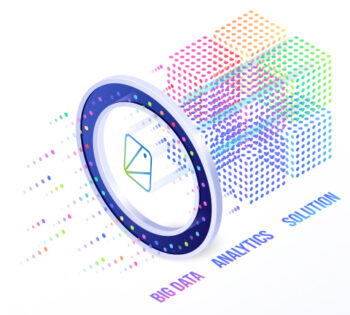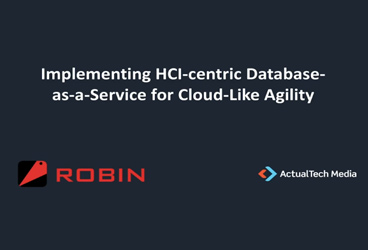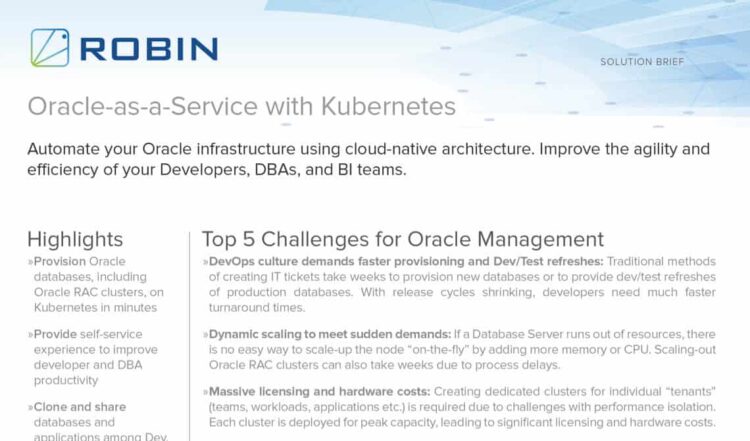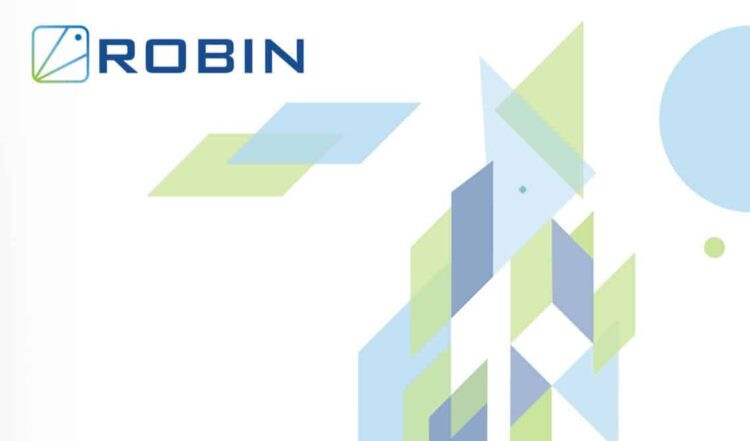
in minutes, not weeks




Deploy, manage and consolidate databases using Robin Cloud Native Platform
Cloud-native Database-as-a-Service
The Robin Cloud Native Platform extends Kubernetes with application automation, built-in storage, and networking, to deliver a production-ready solution for database management. Robin automates the provisioning and management of databases so that you can deliver an “as-a-service” experience with one-click simplicity to developers, DBAs, and data scientists.


Accelerate growth on your terms
Rapidly provision databases on any Kubernetes in any cloud
Protect against data loss from user or configuration errors via
1-click snapshots
Space efficient backups and push-button restore of databases
Scale databases horizontally and vertically to meet changing needs
Create test dev clones of database and application environments
Automate database upgrades


























Why you need Robin to run databases on Kubernetes
- Eliminate tedious, error-prone manual steps and provision highly-available databases in minutes with automation. Achieve consistency of experience by using the same workflow to deploy and manage the lifecycle of databases on-premises or in the cloud. Robin takes away the tedious manual effort of provisioning databases on Kubernetes by providing an easy-to-use interface that focuses on the resource needs of the databases, its placement, performance and available needs and automatically works with Compute, Storage and Networking scheduling to rapidly bring up a database in minutes. It does so by providing a simple, fast and consistent interface from a single control plane.
- Kubernetes' lack of awareness of data allocations for PVCs means that in certain scenarios, for example, when the server on which a Pod is running loses network connectivity, it can take 8-10 minutes for your Database Pod to be failed over to (restarted on) another node. Robin enables rapid failover of your databases while ensuring strong consistency through the built-in application aware technology of Robin Storage. Robin drastically reduces database failover times by 25 times.
- Multiple databases can be scheduled on the same physical server in Kubernetes. The performance of each database varies based on the query and update load. One user doing a full table scan or massive join can generate an excessive amount of storage IOs taking IO bandwidth away from other databases sharing the same server. This can result in unpredictable query times for users using these databases. Robin's application-aware QoS ensures that each database can be capped to a certain number of storage bandwidth, thus ensuring that noisy neighbors don't drag down the performance of the tenants sharing the same server.
- Most modern databases are distributed in nature and mandate that the compute and storage allocations adhere to strict affinity, anti-affinity and data locality policies to be resilient to server, pod and disk failures. Kubernetes scheduler is completely unaware of how the CSI layer allocates storage for PVCs.
- User accidently dropped a table or corrupted a record or just want to see what your data looked like at a prior date? Take point-in-time snapshots of any database with the push of a button and restore your database to any point in time within your selected retention period.
- Backup and/or restore terabyte-sized databases across cloud environments in a matter of minutes. Works with any database. Robin includes incremental backups that move only the changed data blocks making backing up your databases fast and efficient with network resources. Restoring your database to a prior state is 1-click, 1-CLI or 1-API operation.
- Fear that failed upgrades will leave your database unusable? Use Robin's failure-proof upgrade automation where upgrades can be validated on clones of a production database before being applied to production.
- Instantly create on-demand virtual clones of any database independent of the size. Using Robin Storage's Redirect-on-Write technology even terabyte-sized databases can be cloned in less than a minute. Database clones help drive faster, accelerated releases, building higher quality applications, and developing against full datasets, reducing the provisioning time and refresh time.


